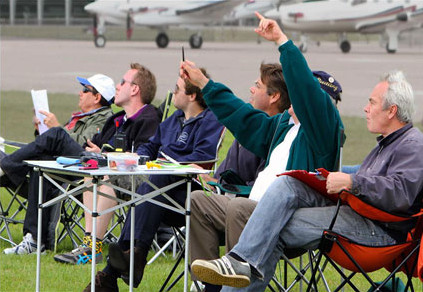What do Judges actually do?
 In order to decide which pilot is best in a reasonably fair and robust way, it is necessary to:
In order to decide which pilot is best in a reasonably fair and robust way, it is necessary to:
- Define exactly what the competitors have to do.
- Establish a system for measuring how closely the elements in each flight meet this definition.
- Use the measuring system to judge each competitor's performance against what is required.
Grading or judging an aerobatic sequence is not a simple task, since the figures can be complex and applying the quite precise grading criteria requires not only a good deal of human "judgement" but the speed and skill to keep up with the action. To programme a computer to evaluate an aerobatic sequence in real time would be a huge task. People, on the other hand, can be trained to be very proficient aerobatic judges.
To become a good judge you must understand the rules, develop the skill to apply them to grading aerobatic figures, and be confident in your own judgement. You need not be an 'expert' nor even a pilot. In fact, being unaware of the difficulty the pilot may be experiencing can be an advantage, since the rules require that it is the pilots skill and not the aircraft's ability which is being assessed. Each year the BAeA runs one or more one-day training courses in the skills and rules required to become an aerobatic judge.
Get involved!
We hope that your curiosity has been aroused by this and that you fancy 'the best seat in the house' at a British national aerobatic competition. The best way to "learn the ropes" is to come to a BAeA Judging School and let us tell you more about it. After attending the course and assisting at some contests, the opening is there to join a panel of 'judges' at one of our national competitions during the season. Alternatively you can simply come to one of our many aerobatic competitions, where you can seek-out the Chief Judge or the Competition Director and ask if you can help on the judging line - there is always the opportunity to be an 'assistant' or 'scribe' for the day, writing the judges' comments and scores onto the pilots score sheets for subsequent transfer into the scoring computer.
- To find out more about the BAeA Judging Schools, contact our judging co-ordinator for further details. More information about this year's sessions are available on the Judging School page.
- To find out when and where the competitions are being held have a look at the BAeA Events Calendar on this web, then contact the BAeA Judging co-ordinator who will help with the local details.
- If you're a pilot and thinking of entering your first competition then visit the BAeA Buddy page - here's a list of friendly people who know the ropes and want to help you get into competition flying.
Why do we need to judge? Judging: British Aerobatics competition classes or levels

